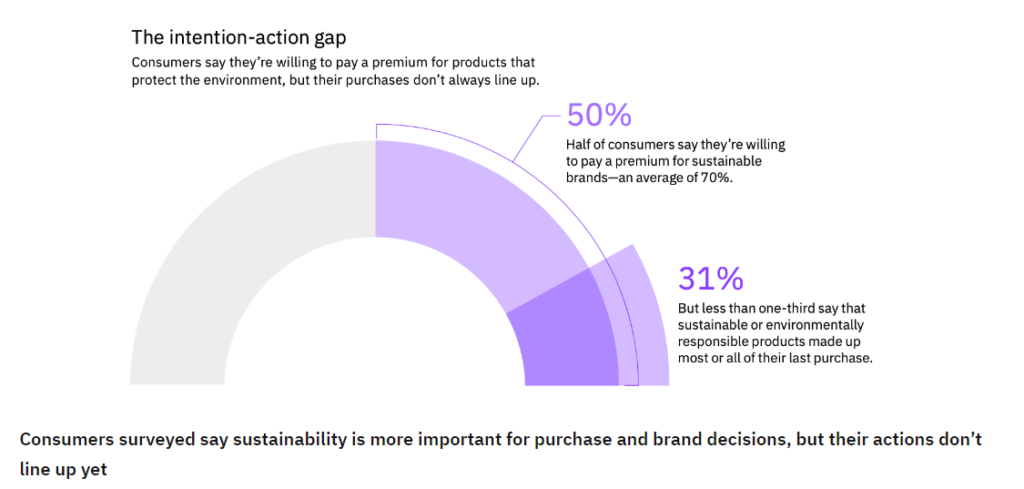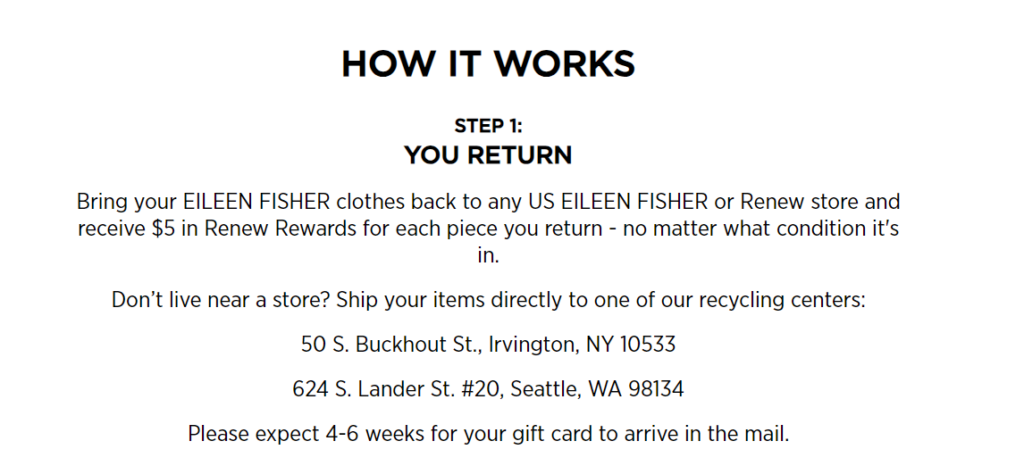
In recent years, sustainability and social responsibility have become increasingly important to consumers. As a result, many brands have integrated these values into their loyalty program strategy. By doing so, these brands are incentivising customer loyalty and promoting eco-friendly practices and social causes. While all that sounds reasonably logical, brands should seek to understand the complexity, nuance and challenges of implementing a reward system around sustainability or social responsibility to ensure that inclusion in the loyalty program does not seem tokenistic. The elements of sustainability and social responsibility included in the loyalty program must also complement the brand’s core offering.
What sort of brands can reward sustainability and responsibility through their loyalty program?
Certain brands may be more inclined to reward sustainable and socially responsible activities based on their industry and core values. For example, brands that produce high volumes of waste, such as fast fashion or fast food companies, may be more motivated to implement loyalty programs that incentivise recycling or waste reduction.
On the other hand, brands whose core products are sustainable offerings, such as outdoor clothing or eco-friendly beauty products, may create loyalty programs that promote circular fashion models or environmentally friendly packaging as this is complementary to their brand.
Additionally, brands prioritising social responsibility may create loyalty programs supporting social causes or community engagement.
Ultimately, as covered in by the Loyalty & Reward Co’s Essential Eight™ principles of effective loyalty programs in Loyalty Programs: The Complete Guide (2nd Edition) by Philip Shelper the loyalty program should complement the brand’s overall mission and values while also encouraging customers to adopt sustainable and socially responsible behaviours.
Do consumers really care about sustainability?
Consumers’ attitudes towards sustainability can vary, but studies suggest that an increasing number of consumers do claim to care about sustainability.
It is important to note that consumers’ actions may not always align with their stated values. For example, a consumer may say that they care about sustainability, but then continue to purchase a majority of products from brands with poor environmental or social practices. This could be due to a variety of factors, such as convenience, price, or lack of awareness.
IBM has conducted a number of studies on consumer attitudes towards sustainability and social responsibility. The findings show that while consumers are increasingly becoming more active in supporting sustainable brands, there is still a gap between intention and attitudes and actual buying behaviour.
This study conducted by IBM in 2022 shows just that.

“The research shows that 62% of consumers surveyed say they are willing to change their purchasing habits to help reduce environmental impact (up from 57% two years ago). More strikingly, half of respondents say they’re willing to pay a premium for sustainability – an average premium of 70%. This is roughly double the premium from 2020.
However, these consumer claims remain somewhat aspirational. There’s a significant gap between what consumers surveyed say and how they actually spend their money. Only 31% of respondents indicated that sustainable products made up more than half of their last purchase.”
Overall, while some consumers may just say they care about sustainability without following through with their actions, there is evidence to suggest that an increasing number of consumers are prioritising sustainability when making purchasing decisions. As a result, brands that incorporate sustainability and social responsibility into their loyalty programs may be more likely to attract and retain customers who share these values.
Many consumers are critical of sustainability initiatives
Sustainability is a multifaceted and complex issue that requires a holistic approach. While it’s an important goal, achieving sustainability can be challenging and may not always be perfect. For instance, some companies may implement green initiatives that focus only on reducing their environmental impact, without considering the social or economic impacts of their actions. One example of this is the use of biofuels, which can lead to deforestation and land-use changes that have negative social and environmental impacts.
Moreover, some sustainability initiatives may have unintended consequences. For example, the use of certain materials in eco-friendly products can have negative impacts on human health.
One common criticism of sustainability is that it is too focused on individual actions and consumer behaviour, rather than addressing systemic issues such as government policies or corporate practices. Critics argue that individual actions alone are not enough to solve complex problems like climate change or social inequality. Another criticism of sustainability is that it can be elitist or exclusionary, as some sustainability initiatives may be expensive or inaccessible to certain groups of people.
Despite these challenges and criticisms, it’s important for individuals and organisations to continue to strive towards sustainability and to approach it with a critical and holistic perspective. Sustainability is a moving target as new technologies and practices emerge. What may be considered sustainable today may not be sustainable in the future as new information and research becomes available. By acknowledging the complexity of sustainability and working towards solutions considering multiple perspectives, we can progress towards a more sustainable future.
The wrath of consumers can be brutal when brands completely neglect sustainability
There have been several instances where consumers have boycotted or dramatically impacted a brand’s sales due to the brand’s lack of social responsibility or sustainability.
Nike Sweatshop Scandal
In the 1990s, Nike was accused of using sweatshop labour in its factories in developing countries, which led to widespread protests and boycotts. Consumers demanded that Nike improve its labour practices, and the company implemented several reforms to address the issue. Nike became a leader in corporate social responsibility by implementing fair labour standards and increasing transparency in its supply chain. The company’s efforts to improve its labour practices helped to restore its reputation and regain the trust of consumers.
Cadbury Palm Oil Controversy
In 2009, Cadbury was accused of sourcing palm oil from suppliers involved in rainforest destruction and human rights violations in Indonesia. The allegations led to a boycott of Cadbury products by consumers and environmental groups. In response, Cadbury committed to using only certified sustainable palm oil in its products by 2010. However, the company faced further criticism when it was revealed that it had not met this goal and was still sourcing palm oil from non-sustainable sources. As a result, Cadbury faced continued pressure from consumers and environmental groups to improve its environmental practices.
Nestle Baby Formula Controversy
In the 1970s, Nestle was accused of promoting baby formula over breast milk in developing countries, despite the unaffordability of formula and lack of access to clean water. The controversy led to a boycott of Nestle products and a decline in sales.
SeaWorld Blackfish Documentary
The release of the documentary Blackfish in 2013 exposed the mistreatment of killer whales at SeaWorld. The film sparked widespread outrage and led to a decline in attendance and revenue for the company.
Volkswagen Dieselgate Scandal
In 2015, Volkswagen was caught cheating on emissions tests for its diesel engines, leading to a major scandal and sales decline. The company faced criticism for violating environmental regulations and deceiving consumers.
Chick-fil-A Anti-LGBTQ Controversy
In 2012, Chick-fil-A’s CEO made public comments opposing same-sex marriage, resulting in protests and calls for a boycott. The controversy led to both support and backlash for the brand, with some customers boycotting the company while others showed their support through increased patronage.
Incorporating sustainability into your loyalty program
Rewarding sustainability and social responsibility through a loyalty program should be carefully commercially modelled to strike a balance between providing an adequate level of reward and ensuring commercial and operational feasibility. It is crucial to design a program that incentivises sustainable behaviours without compromising the financial viability of the business. This involves considering factors such as the cost of rewards, the frequency of redemption, and the overall impact on profitability. By conducting thorough market research, analysing customer behaviour, and understanding the financial implications, businesses can develop a loyalty program that aligns with their sustainability goals while still being commercially viable. This balance ensures that the program motivates customers to engage in sustainable actions while also contributing to the long-term success and growth of the business.
Some well-known examples of brands weaving sustainability and social responsibility into their programs:
Patagonia Worn Wear
Patagonia, an outdoor clothing company, has a program “Worn Wear” focused on sustainability. They encourage customers to bring in their used Patagonia clothing for repair or recycling, and in return, they receive store credit.
TOMS Passport Rewards
TOMS offers a points program that also rewards members with exclusive discounts and early access to sales. Between 2006-2020, they also had a “One for One” program where they donated a pair to someone in need for every pair of shoes purchased, resulting in 100,000,000 shoes donated by the end of the period. TOMS has since evolved the program into one whereby 1/3 of profits are now donated to grassroots causes. The original program was reportedly not commercially sustainable.
Grill’d
Grill’d, an Australian burger chain, has a component of their Relish loyalty program called 8 and Donate whereby for every 8 burgers purchased by a customer, they get the opportunity to either redeem a free burger or donate one to a homeless person (facilitated by St Vincent De Paul).

Eileen Fisher Renew
Eileen Fisher, a sustainable fashion brand, offers a loyalty program called Renew that encourages customers to bring in their gently used Eileen Fisher clothing for resale. Members receive a gift card as a reward to promote the circular fashion model and environmental responsibility.

Levi’s SecondHand
Levi’s offers a program called SecondHand that encourages customers to bring in their used Levi’s clothing for resale. Trade-in credits range from $5 to $30 based on the item’s age and original retail price.
H&M Conscious
Fast fashion brand H&M offers a loyalty program called Conscious that rewards customers for recycling their clothing. Members can earn Conscious points by purchasing sustainable items from H&M’s Conscious range, identifiable in-store via a green label.
Members can also earn bonus Conscious points for bringing their own reusable bag or by recycling their old garments at H&M stores, where they will automatically receive a digital 15% off voucher.
Read more ab out H&Ms loyalty initiatives here.
Thinking about incorporating sustainability into your loyalty program?
Brands that reward sustainability ensure that it ties in nicely with their existing brand offering and is complementary to their overall mission and values. These brands create a cohesive and authentic customer experience by aligning sustainability with their core brand identity. Whether it’s through product innovation, responsible sourcing, or eco-friendly packaging, sustainable initiatives are seamlessly integrated into the brand’s offerings.
To explore the potential of incorporating sustainability into a loyalty program or creating a new loyalty program, brands can turn to consultants like Loyalty & Reward Co, which specialises in helping brands design and implement effective loyalty programs. They can provide valuable insights and strategies to ensure sustainability is effectively integrated into the loyalty program.

